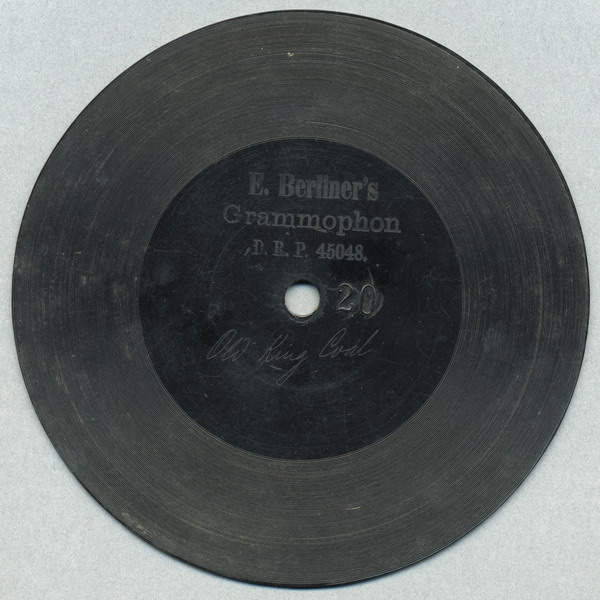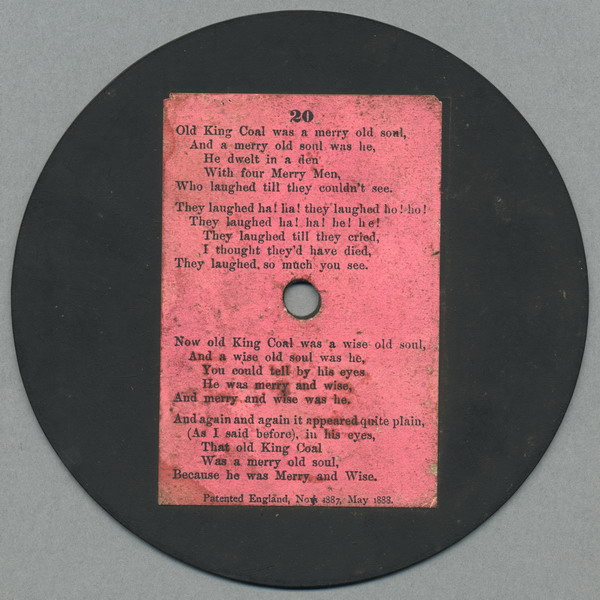

|
|
|||
|
Retour à la page d'accueil des disques Berliner Gramophone de 12,5 cm |
|||
|
|
|||
Le catalogue en ligne des disques Berliner Gramophone de 12,5 cm
The Gramophone five inch Berliner records online catalogue
OLD KING COAL


To listen (fragment)
Berliner 5 inch record #20 - OLD KING COAL
A legendary king of Celtic Britain, about all that can be said about Old King Cole with any certainty is that:
Old King Cole was a merry old soul
And a merry old soul was he;
He called for his pipe, and he called for his bowl
And he called for his fiddlers three.
Every fiddler he had a fiddle,
And a very fine fiddle had he;
Oh there's none so rare, as can compare
With King Cole and his fiddlers three.So runs a traditional nursery rhyme the earliest mention of which appeared in 1708-9. Cole, or more properly Coel (pronounced like the English word coil), is a Brythonic name possibly derived from the Roman Caelius, and there are several candidates for a historical basis to the rhyme amongst both the legendary and historical kings of the Romano-British and sub-Roman period.
- King Cole of Colchester
Popular British legend tells us that there is said to have been a King Cole living in the town of Colchester in Essex in the third century AD. In about 1129, Henry of Huntingdon claimed that Cole was the father of St Helena and therefore grandfather of the Roman Emperor, Constantine the Great. 'Colchester' can be interpreted as meaning 'Cole's castle', although it is generally thought to derive from the River Coln, itself named after the Roman colonia established there. The town also contains an old Roman quarry called 'King Cole's Kitchen'.
In his Historia Regum Britanniae, Geoffrey of Monmouth lists a King Cole as a king of the Britons following the reign of King Asclepiodotus. However, Geoffrey of Monmouth's history is highly untrustworthy. Geoffrey expands Cole's story, stating that, upset with Asclepiodotus's handling of Diocletian's massacres, he began a rebellion in the duchy of Caercolun (Colchester), of which he was duke. He met Asclepiodotus in battle and killed him, thus taking the kingship of Britain upon himself. Rome, apparently, was thrilled that Britain had a new king and sent a senator, Constantius Chlorus, to negotiate with Cole. Afraid of the Romans, Cole met Constantius and agreed to pay tribute and submit to Roman laws as long as he was allowed to retain the kingship of Britain. Constantius agreed to these terms but, one month later, Cole died. Constantius married Cole's daughter, St Helena, and crowned himself as Coel's successor. Helen later gave birth to a son who became the Emperor, Constantine the Great.
Native client kings only survived for a few years after the Roman invasion, but leading tribal families may still have held positions of power at this later period. This character is, however, most likely to be a memory of the great pre-Roman King Cunobelinus of the Catuvellauni tribe – Shakespeare's Cymbeline – who made Colchester his capital. Yet another possibility is that Cole is the Celtic deity, Camulus, a god of war. The old Brythonic name of Colchester was Camulodunum, and the derivation sequence /kamul/ (+ lenition) > /kawul/ > /kaul/ > /ko:l/ is possible, especially among the Celtic languages. If Camulus is Cole, then Colchester (from the Latin for 'Cole's fortress') and Camulodunum (from Brythonic Celtic for 'Camulus' fortress') are synonyms. It is possible that the Latin form is a calque on the Celtic.
- King Coel of Northern Britain
An altogether more historical character was Coel Hen, a Welsh name which actually means 'Coel the Old'. He appears in a number of Old Welsh pedigrees – notably the Bonedd Gwyr y Gogledd (or 'The Descent of the Men of the North') – at the head of several post-Roman Brythonic Royal families of the Hen Ogledd, the "Old North" covering modern Northern England and Southern Scotland, including those ruling Rheged, Elmet and possibly York, Bryneich, the other kingdoms in the Pennines and possibly the Gododdin territory extending well into Scotland. He is also considered to be the father-in-law of Cunedda, founder of the Kingdom of Gwynedd in North Wales, by his daughter Gwawl. The so-called Arthur stone names him as an ancestor of Artognou, a post-Roman ruler at Tintagel. King Coel was born to Cunedda I. His siblings were Ceredig, Edurn, Meirionydd, Dunoding, Rhufoniog, and Dogfeling. His children were Garmonion, Cunedda II Menrudd, and Gwawl.
Projections back from dated individuals suggest that Coel Hen lived around AD 350–420, during the time when the Romans withdrew their forces from Britain. This has led historians, such as John Morris, to suggest that he may have been the last of the Roman Duces Brittanniarum (Dukes of the Britons) who commanded the Roman army in Northern Britain. He may have taken over the northern capital at Eburacum (York) to rule over what had been the northern province of Roman Britain. Upon Coel Hen's death, his lands would have been split between his sons, Garmonion and Cunedda II, and later his grandsons, Dunwal Moelmut, Cunedda III, and Gwrwst Ledlwn, thus creating the many old northern kingdoms of Britain. WF Skene recorded traditions of his death whilst campaigning in the Kyle district of what was later called Ayrshire (Scotland), which was subsequently named after him.
Welsh sources also give this man the alternative name of Coel Godhebog, meaning 'Coel the Magnificent' or 'Coel the Defender', but David Nash Ford considers this name may have been transferred from Cole of Colchester. From the 15th century to the 18th century, the two were certainly much confused. There are a number of other lesser known Coels mentioned in various Old Welsh sources too.
Later interpretations
Iona and Peter Opie believe the 'Old King Cole' of nursery rhyme fame was really 'Old Cole' (alias Thomas Cole-brook), a supposed 12th century Reading cloth merchant whose story was recounted by Thomas Deloney in his The Pleasant History of Thomas of Reading (circa 1598). Some analysts think it unlikely that the nursery rhyme was written before 1585, when Sir Walter Raleigh introduced tobacco into England. Others consider the "pipe" referred to may not have been a smoking pipe, but rather a musical instrument, or a measure of wine. The theory that "pipe" refers to a musical instrument (probably some form of woodwind instrument) is further suggested by the final lyrics of the song "there's none so rare, As can compare With King Cole and his fiddlers three", which seem to suggest that King Cole and his fiddlers played music together as a group. The term "pipe" is commonly used as an "informal term for a flute or recorder". The word ceol actually means music in Gaelic, and this may be the origin of the name in the rhyme.
Modern usage
In the United States, "King Coal" is sometimes invoked as a metaphor for the centrality of coal mining in the economy of Appalachia, a role similar to that played by King Cotton in the Deep South.
In Canada, King Cole is a brand of tea which has been manufactured by G.E. Barbour Inc for about a century.
The late Nat 'King' Cole has stated in the past that he based his name on the fable of King Cole, the merry old soul.
In the Fables comic book, King Cole was the long-time mayor of 'Fabletown', a secret community of 'Fables', who were forced into exile in our world by a conqueror at home. He was defeated in an election by Prince Charming and is no longer mayor. He then became ambassador of 'Fabletown' to the Arabian fables.
The prog rock band Genesis included the rhyme on their song "The Musical Box", from their 1971 album Nursery Cryme.
In the 1970s, American comedian George Carlin offered this alternative:
Old King Cole was a merry old soul
And a merry old soul was he;
He called for his pipe, and he called for his bowl -
I guess we all know about Old King Cole...The manner in which Carlin spoke the final line suggested that the pipe and bowl can be interpreted as marijuana references.
The United States military also has a version in the form of a marching cadence during the 1980s and in to the present:
Old King Cole was a merry old soul
and a merry ol' soul was he, uh huh.
He called for his pipe, and he called for his bowl
and he called for his privates three, uh huh.
Beer! Beer! Beer! cried the private.
Brave men are we
There's none so fair as they can compare
to the airborne infantry, uh huh.The cadence included a verse for ranks from private to captain that included a dig at each rank. There seems to be a reference to the nursery rhyme in Joyce's Finnegans Wake (619.27f): "With pipe on bowl. Terce for a fiddler, sixt for makmerriers, none for a Cole."
Joyce is at the same time punning on the canonical hours Tierce, Sext, Nones (Terce ... sixt ... none) and on Finn MacCool (fiddlers ... makmerriers ... Cole)
Queen's song "Great King Rat":
"Great King Rat was a dirty old man
And a dirty old man was he
Now what did I tell you
Would you like to see?"This text is from Wikipedia : http://en.wikipedia.org/wiki/Old_King_Cole